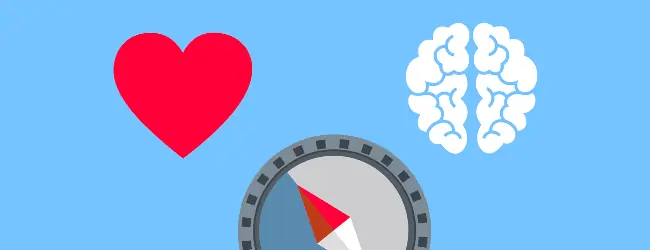In the previous article (this article), I mentioned an unstoppable loop of emotional thinking triggered by others’ negative emotions. Let’s look at the process more deeply.
How to stop emotional exhaustion
Sometimes, we want to stop mental exhaustion caused by our intense empathy.
Others’ negative emotions, such as anger, complaint, sadness, and lament, dominate our minds for a long time. We cannot eliminate them. That drains us.
That imposes limitations on us. For example, we might try to avoid conversing with less empathic people. This is because they often complain about others. We might have tried not to watch the news on television and the internet, which reports only misfortunes. We might also dislike people who only criticize others.

Emotional exhaustion causes them. That is why we want to solve this problem.
One solution is to develop our logical sense. It allows us to stop endless emotional thinking.
To make it easier to understand, I will explain the big picture of endless loop thinking in this article. Although I have explained this process many times, I made it simpler. This logic might allow you to solve your mental exhaustion.
Empathic judgment and logical judgment
Cultivating rational judgment will solve your mental exhaustion if you are empathic and logical.
To understand why, let’s look at how we struggle with unstoppable loop thinking caused by empathy.
We have two kinds of judgment: empathic and logical. Empathy can trigger logical sense, but not vice versa. Let’s look at the process of empathic thinking transitioning to logical thinking.
Suppose we saw a fraud case on the news. An evil scammer deceived and stole a lot of money from an innocent person. The news appeals to the good person’s sorrow and the evil one’s cruelty. Let’s look at how our mind works.
First, we make judgments based on empathy. We empathize with sadness and anger, as the news intended. Empathy always stands by the side of weak people. That makes us want to save him and solve this matter.

However, empathy is not good at solving problems. It can only do what it knows.
That makes us switch to logical thinking unconsciously. Logical sense is rational and creative.
Then, we try to make judgments based on it. To think logically, we consider the causal relationship and countermeasures. The typical question is, “Why did this problem happen, and how can I solve it?”
We have to make some conscious decisions here. Otherwise, we are going back to the first step again. We remember the news, feel negative emotions, and repeat that emotional reaction endlessly. That exhausts us.
Is fraud evil?
It means that rational judgment terminates the loop of thought.
Even if rationality goes against empathic values, it doesn’t matter.
For example, the news may treat the scammers as evil. However, rationality tells us that it is a matter of moderation. In other words, we cannot distinguish whether fraud is good or bad.

In my case, I like fishing in the sea. I bait and fish. From the perspective of the fish, that is a scam. The fish thinks it is food, but it contains a hook inside, connected by a line. I trick the fish and happily eat them.
Logically speaking, I cannot deny fraud. I am also committing fraud to some extent. It is a matter of moderation.
Thinking in terms of moderation
For another example, I like to know about unique dishes at restaurants from blogs. Some restaurants provide affordable food, while some charge a high price for small portions.
I used to resent overpriced restaurants. I thought they were scammers. However, I realized that my thought was irrational. The higher the price it can be sold for, the more efficient it is in earning money. In other words, they live based on their rationality. I cannot deny it.
The same goes for scammers. They are trying to be as efficient as possible. Rationality is not about good or bad, but about moderation. Where to draw the line is something that society decides, not me.

That realization made me decide to leave it to society, and that calmed me down. I don’t need to pass judgment directly. I don’t have to think about this matter any further.
Although my rationality went against my empathy, it prevented the endless loop of thinking. That is the proper process of clearing emotions.
On the other hand, if I stick to being empathic, I cannot decide how to deal with the problem. All I can do is repeat the best measures I know, and I understand it has no effect. That causes unstoppable emotional thinking.
Conclusion
That is the big picture of endless loop thinking.
Developing our logical sense allows us to stop endless cyclical emotional thinking.
This logic might allow you to solve your mental exhaustion.
Thank you for reading this article. I hope to see you in the next one.


